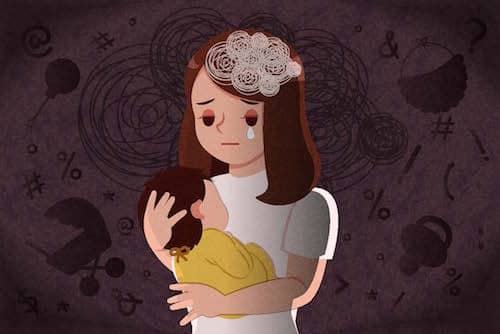December 18, 2019
 Many of us have heard the term “baby blues,” when a mother feels tired, worried or down for a few days after having a baby. It’s more common than one might think: up to 80% of mothers will experience these feelings. But when a new mother has significant symptoms for weeks during or after the pregnancy, it may be postpartum depression (PPD), which affects about 15% of mothers.
Many of us have heard the term “baby blues,” when a mother feels tired, worried or down for a few days after having a baby. It’s more common than one might think: up to 80% of mothers will experience these feelings. But when a new mother has significant symptoms for weeks during or after the pregnancy, it may be postpartum depression (PPD), which affects about 15% of mothers.
When someone has PPD, they may have one or a few symptoms. Everyone’s experience is a little different. Some of these feelings may be intense while others may be mild. Symptoms may include:
If any of these symptoms last more than a week or two after the baby is born, you should reach out for help.
There are more serious symptoms to watch for, too. You should seek immediate help if you start feeling really detached from your life, as if you’re watching things going on around you, but you’re not part of it. Sometimes you might hear voices or your thoughts seem “really loud.” You should also get help immediately if think you might harm yourself or your baby.
PPD can happen to any mother. It can happen as a result of hormone changes that occur during pregnancy. A few weeks before the baby is born, huge hormone shifts start telling the body it’s time for the baby to be born. These changes can affect parts of the brain linked to depression.
When the hormones are strongest — those few weeks before and after birth — is when feelings of depression and anxiety are most likely to start.
Sometimes family members and friends may tell you that you should “just get over it.” You might even feel guilty or ashamed for not being able to get over it. Knowing what to watch for is very important. So is getting help early. Waiting to see if symptoms of PPD go away on their own can actually makes things worse. The longer depression goes unchecked, the harder it is to treat.
The good news is that there are more treatment options available than ever before to help a new parent address their unique symptoms and start feeling better again.
Finding a doctor you feel comfortable talking with about what you’re experiencing during pregnancy is a good way to catch PPD symptoms as early as possible. During visits, your doctor should include conversations about your mental health as a normal part of your appointment.
If you’re feeling like you need help, reach out to your doctor. They can be a good source of support, information and treatment, and may refer you to a psychiatrist. They may prescribe therapy, medication or a combination of the two to help relieve your symptoms and help you feel better.
While some medications may be considered safe for expectant or nursing mothers, it’s worth a discussion with your doctors to determine your best approach. That might include feeding your child with formula so you can receive appropriate treatment. Your doctor will help to make sure you’re not putting a baby at risk for complications as a result of medication while also making your mental health a priority. A mental health professional will help you address your symptoms so you can be there for your child.
Just like any other medical condition, PPD isn’t something to feel ashamed of, and is never something you should have to handle alone.
Dr. Pamela Wright-Etter is Vice President of Medical Services for Cardinal Innovations Healthcare. She is a psychiatrist based in Charlotte, N.C., who has been in practice for over 28 years. Board certified in Psychiatry and Forensic Psychiatry by the American Board of Psychiatry and Neurology, Wright-Etter has been in private practice as president and owner of N.C. Psychiatric Associates since July 1990.Wright-Etter has been a Clinical Professor of Neuroscience and Behavioral Medicine at the University of South Carolina since 1997, teaching fellows in Forensic Psychiatry. Since 2013, she has also served as Medical Director/consultant with TranscendE.
If you’d like more information, here are a couple of excellent websites about PPD depression:
We’re always accepting submissions to the NAMI Blog! We feature the latest research, stories of recovery, ways to end stigma and strategies for living well with mental illness. Most importantly: We feature your voices.
Check out our Submission Guidelines for more information.
We’re always accepting submissions to the NAMI Blog! We feature the latest research, stories of recovery, ways to end stigma and strategies for living well with mental illness. Most importantly: We feature your voices.
LEARN MORENAMI HelpLine is available M-F, 10 a.m. – 10 p.m. ET. Call 800-950-6264,
text “helpline” to 62640, or chat online. In a crisis, call or text 988 (24/7).